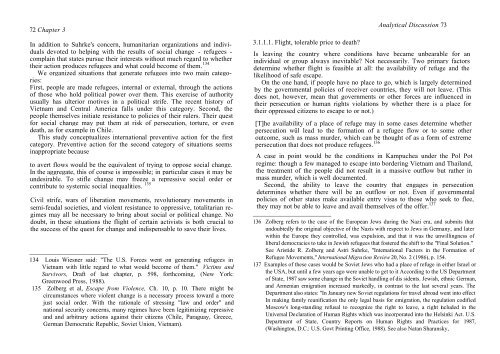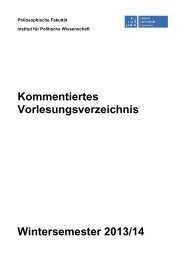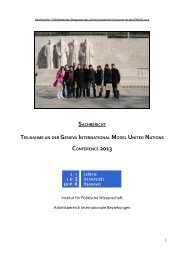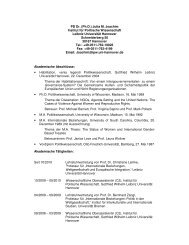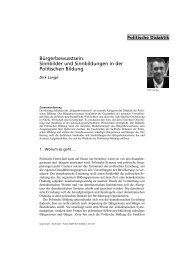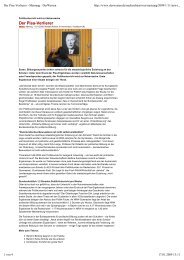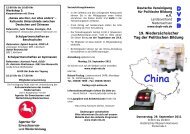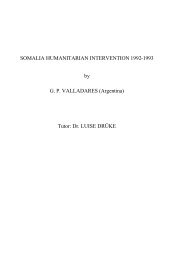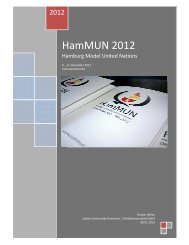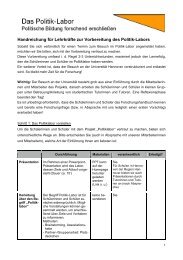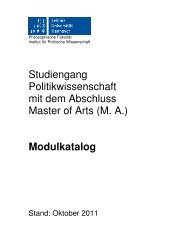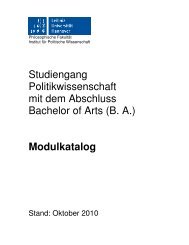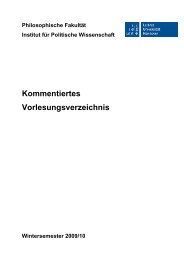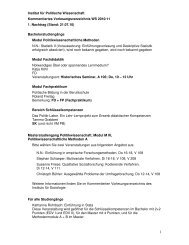Preventive Action for Refugee Producing Situations
Preventive Action for Refugee Producing Situations
Preventive Action for Refugee Producing Situations
You also want an ePaper? Increase the reach of your titles
YUMPU automatically turns print PDFs into web optimized ePapers that Google loves.
72 Chapter 3<br />
In addition to Suhrke's concern, humanitarian organizations and individuals<br />
devoted to helping with the results of social change - refugees -<br />
complain that states pursue their interests without much regard to whether<br />
their action produces refugees and what could become of them. 134<br />
We organized situations that generate refugees into two main categories:<br />
First, people are made refugees, internal or external, through the actions<br />
of those who hold political power over them. This exercise of authority<br />
usually has ulterior motives in a political strife. The recent history of<br />
Vietnam and Central America falls under this category. Second, the<br />
people themselves initiate resistance to policies of their rulers. Their quest<br />
<strong>for</strong> social change may put them at risk of persecution, torture, or even<br />
death, as <strong>for</strong> example in Chile.<br />
This study conceptualizes international preventive action <strong>for</strong> the first<br />
category. <strong>Preventive</strong> action <strong>for</strong> the second category of situations seems<br />
inappropriate because<br />
to avert flows would be the equivalent of trying to oppose social change.<br />
In the aggregate, this of course is impossible; in particular cases it may be<br />
undesirable. To stifle change may freeze a repressive social order or<br />
contribute to systemic social inequalities. 135<br />
Civil strife, wars of liberation movements, revolutionary movements in<br />
semi-feudal societies, and violent resistance to oppressive, totalitarian regimes<br />
may all be necessary to bring about social or political change. No<br />
doubt, in these situations the flight of certain activists is both crucial to<br />
the success of the quest <strong>for</strong> change and indispensable to save their lives.<br />
_______________________<br />
134 Louis Wiesner said: "The U.S. Forces went on generating refugees in<br />
Vietnam with little regard to what would become of them." Victims and<br />
Survivors, Draft of last chapter, p. 598, <strong>for</strong>thcoming, (New York:<br />
Greenwood Press, 1988).<br />
135 Zolberg et al, Escape from Violence, Ch. 10, p. 10. There might be<br />
circumstances where violent change is a necessary process toward a more<br />
just social order. With the rationale of stressing "law and order" and<br />
national security concerns, many regimes have been legitimizing repressive<br />
and and arbitrary actions against their citizens (Chile, Paraguay, Greece,<br />
German Democratic Republic, Soviet Union, Vietnam).<br />
3.1.1.1. Flight, tolerable price to death?<br />
Analytical Discussion 73<br />
Is leaving the country where conditions have became unbearable <strong>for</strong> an<br />
individual or group always inevitable? Not necessarily. Two primary factors<br />
determine whether flight is feasible at all: the availability of refuge and the<br />
likelihood of safe escape.<br />
On the one hand, if people have no place to go, which is largely determined<br />
by the governmental policies of receiver countries, they will not leave. (This<br />
does not, however, mean that governments or other <strong>for</strong>ces are influenced in<br />
their persecution or human rights violations by whether there is a place <strong>for</strong><br />
their oppressed citizens to escape to or not.)<br />
[T]he availability of a place of refuge may in some cases determine whether<br />
persecution wül lead to the <strong>for</strong>mation of a refugee flow or to some other<br />
outcome, such as mass murder, which can be thought of as a <strong>for</strong>m of extreme<br />
persecution that does not produce refugees. 136<br />
A case in point would be the conditions in Kampuchea under the Pol Pot<br />
regime: though a few managed to escape into bordering Vietnam and Thailand,<br />
the treatment of the people did not result in a massive outflow but rather in<br />
mass murder, which is well documented.<br />
Second, the ability to leave the country that engages in persecution<br />
determines whether there will be an outflow or not. Even if governmental<br />
policies of other states make available entry visas to those who seek to flee,<br />
they may not be able to leave and avail themselves of the offer. 137<br />
_______________________<br />
136 Zolberg refers to the case of the European Jews during the Nazi era, and submits that<br />
undoubtedly the original objective of the Nazis with respect to Jews in Germany, and later<br />
within the Europe they controlled, was expulsion, and that it was the unwillingness of<br />
liberal democracies to take in Jewish refugees that fostered the shift to the "Final Solution."<br />
See Aristide R. Zolberg and Astri Suhrke, "International Factors in the Formation of<br />
<strong>Refugee</strong> Movements," International Migra tion Review 20, No. 2 (1986), p. 154.<br />
137 Examples of these cases would be Soviet Jews who had a place of refuge in either Israel or<br />
the USA, but until a few years ago were unable to get to it According to the US Department<br />
of State, 1987 saw some change in the Soviet handling of dis sidents. Jewish, ethnic German,<br />
and Armenian emigration increased markedly, in contrast to the last several years. The<br />
Department also states: "In January new Soviet regulations <strong>for</strong> travel abroad went into effect<br />
In making family reunification the only legal basis <strong>for</strong> emigration, the regulation codified<br />
Moscow's long-standing refusal to recognize the right to leave, a right included in the<br />
Universal Declaration of Human Rights which was incorporated into the Helsinki Act. U.S.<br />
Department of State, Country Reports on Human Rights and Practices <strong>for</strong> 1987,<br />
(Washington, D.C.: U.S. Govt Printing Office, 1988). See also Natan Sharansky,


